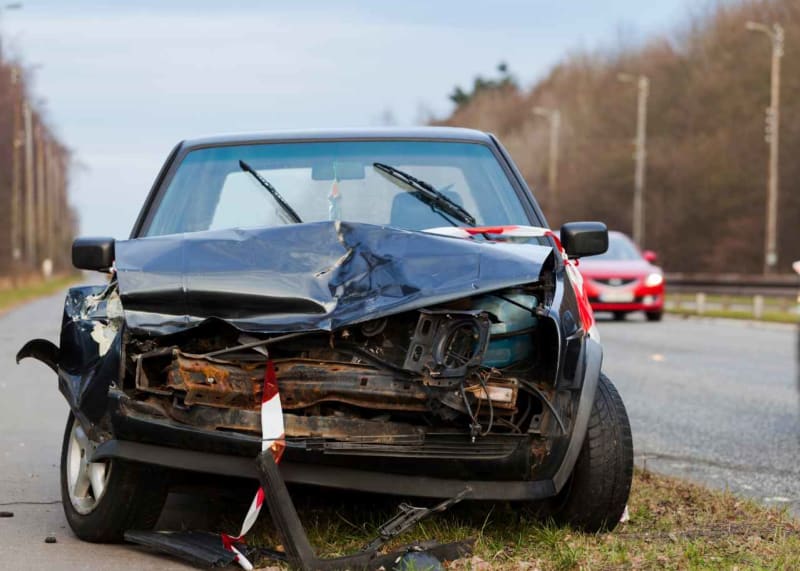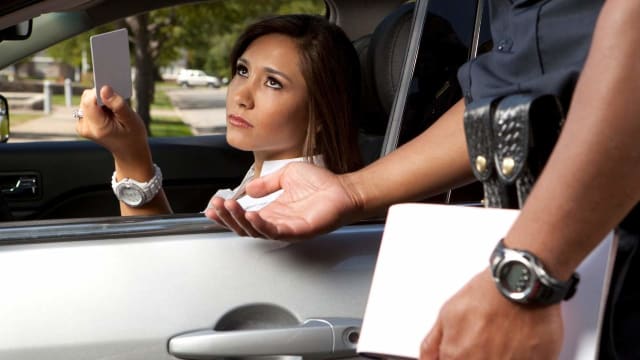- Illinois Laws Regarding Leaving the Scene of an Accident
- Is Leaving the Scene of an Accident Always a Crime in Illinois?
- Penalties for Leaving the Scene of an Accident
- The Role of Law Enforcement in Leaving the Scene Cases
- Common Scenarios Involving Hit-and-Run Drivers
- Impact on Driving Privileges and Insurance Rates
- Defenses Against Hit-and-Run Charges
- What You Should Do If You’re Charged with a Hit-and-Run
- Charged After Leaving the Scene? Get Legal Help
Leaving the scene of an accident in Illinois—even if there are no injuries—can still lead to serious legal consequences. State law requires drivers to stop, exchange information, and report certain accidents to law enforcement. Failing to do so could result in substantial fines, a suspended driving license, or even criminal charges, depending on the circumstances.
If you’re facing charges for leaving the scene of an accident, it’s important to understand your legal options. A traffic defense attorney in Rolling Meadows can help protect your rights and work toward the best possible outcome. Don’t risk penalties—seek legal guidance as soon as possible. Call Dohman Law at (847) 359-4005 to schedule a free consultation and get started defending your case.
Illinois Laws Regarding Leaving the Scene of an Accident
Under Illinois law, drivers involved in an accident must follow specific legal obligations. Failing to do so can result in severe penalties, including criminal charges.
Illinois law requires that any driver involved in an accident that results in damage to property must stop at the scene. The driver must remain long enough to provide insurance details and personal information to the responsible party and, if necessary, report the accident to law enforcement. If an accident causes property damage, drivers must:
- Stop at the scene or as close as possible without blocking traffic.
- Provide their name, address, license plate number, and vehicle registration to the other driver or property owner.
- Show their driver’s license upon request to prove they are a valid driver.
- Provide insurance details, including the name of their insurance provider.
- Report the accident to the police if required by law, such as when damages exceed $1,500.
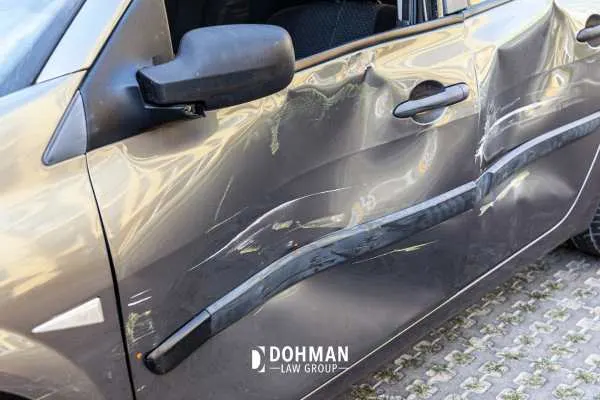
Leaving the scene of an accident involving damage to property is a Class A misdemeanor in Illinois. This can result in:
- Fines of up to $2,500.
- Up to one year in jail or days in jail if mitigating factors apply.
- Driver’s license suspension in some cases.
If the accident involves injuries or death, the penalties become much more severe, potentially leading to felony charges. Anyone accused of leaving the scene should seek legal advice immediately to understand the legal implications and possible defenses.
Is Leaving the Scene of an Accident Always a Crime in Illinois?
Leaving the scene of an accident is generally a crime in Illinois, but the severity of the criminal offense depends on the circumstances. Under 625 ILCS 5/11-402, drivers involved in an accident causing property damage must stop, provide their information, and, if necessary, report the incident to the police. Failing to do so is a Class A misdemeanor.
If the accident involves personal injury or death, the penalties are much more severe. Under 625 ILCS 5/11-401, leaving the scene of an accident involving bodily injury is a Class 4 felony, while leaving the scene of a deadly accident is a Class 2 felony offense.
However, in rare cases, a driver may not face criminal charges. For example, if someone leaves the scene due to an emergency, such as needing immediate medical care at a medical facility or safety concerns, but promptly reports the accident, the court may consider those factors. But in most situations, leaving the scene violates Illinois law and can lead to criminal penalties, license suspension, and increased costs with your insurance company.
Additionally, in civil cases, the two-year statute of limitations applies to claims for damages related to the accident, including medical bills.
Penalties for Leaving the Scene of an Accident
Leaving the scene of an accident in Illinois carries serious legal consequences, which vary based on the severity of the crash. The penalties depend on whether the accident resulted in property damage, personal injury, or death.
If the accident only caused damage to property, fleeing the scene is considered a Class A misdemeanor. However, if someone was injured, the charge escalates to a Class 4 felony, and in cases involving a fatality, it can become a Class 2 felony. The severity of the charge impacts the potential penalties, including fines, jail time, and license consequences.
- Class A Misdemeanor (leaving the scene of a property damage accident):
- Up to one year in jail
- Fines reaching $2,500
- Possible driver’s license suspension
- Class 4 Felony (leaving the scene of an accident involving personal injury):
- One to three years in prison
- Fines up to $25,000
- Class 2 Felony (leaving the scene of a fatal accident):
- Three to seven years in prison time
- Substantial fines
Additionally, the Illinois Secretary of State may suspend or revoke a driver’s license, depending on the case. A conviction can also have financial consequences, as an insurance provider may increase premiums or deny coverage following an accident.
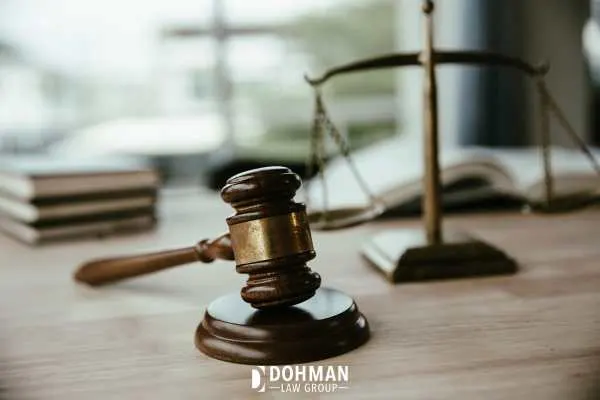
If you are facing these charges, working with an experienced accident attorney can help you understand your rights and build an effective defense. Whether the case involves personal injury, damage to property, or allegations of driving under the influence of alcohol, legal representation is crucial to achieving the best possible outcome.
The Role of Law Enforcement in Leaving the Scene Cases
When law enforcement is called to investigate an accident, they will often conduct a thorough review of the circumstances. Officers may:
- Collect witness statements
- Review traffic camera footage
- Check for damage to property at the accident scene
- Investigate any potential influence of alcohol
If a driver is identified as leaving the scene, they may be asked to surrender at a police station for further questioning or face an arrest warrant. Additionally, if a person involved in the accident requires emergency care, they may be transported to a medical facility, where law enforcement will later question them regarding the incident.
Common Scenarios Involving Hit-and-Run Drivers
There are several common scenarios in which hit-and-run drivers face legal consequences, including:
- Striking a parked car and failing to leave insurance information
- Leaving an accident scene after minor fender-benders
- Hitting a pedestrian or cyclist and driving away
- Causing damage to property and failing to report the accident
In Illinois, counties like Lake County and DuPage County have strict enforcement policies regarding hit-and-run offenses, and law enforcement aggressively pursues drivers suspected of fleeing accident scenes.
A lawyer experienced in defending traffic offenses can help address any accusations and work toward a resolution that minimizes penalties. If you have been accused of leaving the scene of an accident, do not delay in seeking legal representation to protect your driving record and future. Whether you are facing a simple traffic ticket or more serious charges, a strong legal defense is essential.
Impact on Driving Privileges and Insurance Rates
Beyond criminal penalties, a conviction can lead to long-term consequences. Drivers may face increased insurance premiums, loss of insurance coverage, or difficulty securing future coverage. A conviction also creates a permanent criminal record, which can affect employment opportunities, especially for jobs that require driving. In some cases, injured parties in a motor vehicle accident may also pursue civil lawsuits against the driver.
Additionally, hit-and-run accident victims may file an accident claim against the driver to recover damages for accident injuries. If the incident involved an unattended vehicle, failure to leave identifying information could further complicate legal matters.
Anyone facing these types of charges for leaving the scene of an accident should seek legal guidance immediately to understand their options and potential defenses.
Defenses Against Hit-and-Run Charges
There are several possible defenses against hit-and-run charges in Illinois, depending on the circumstances of the case. A strong defense may help reduce charges or avoid a conviction.
One possible defense is mistaken identity. If law enforcement identifies the wrong person as the driver, a defense attorney may challenge the evidence linking the accused to the vehicular accident, such as surveillance footage or witness testimony.
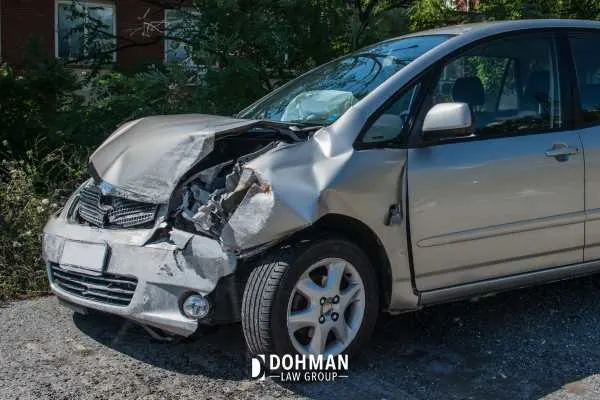
In some cases, leaving for safety reasons may be a valid defense. If a driver reasonably feared for their safety—such as in a road rage incident or a dangerous neighborhood—they may argue that they left to avoid harm and later reported the motor vehicle accident.
Finally, a driver may claim they were not legally required to stop. If they were not directly involved in the accident after rear impact or if they had already provided the necessary information at the scene, they may not be guilty of a hit-and-run violation.
Because hit-and-run charges carry severe penalties, anyone accused should consult a defense attorney to assess their options and build the strongest possible case.
What You Should Do If You’re Charged with a Hit-and-Run
If you are charged with a hit-and-run in Illinois, taking the right steps can help protect your rights and improve your chances of a favorable outcome.
- Do Not Admit Fault: Avoid making statements to the police or others that could be used against you. Anything you say can be used as evidence, so it’s best to remain silent until you speak with an attorney.
- Consult a Criminal Defense Attorney Immediately: An experienced law firm can review the details of your case, explain your legal options, and build a defense strategy. Early legal intervention may help reduce charges or negotiate a better resolution.
- Gather Evidence: If possible, collect any evidence that supports your case. This may include dashcam footage, witness statements, or records that prove you were not at the scene. Your attorney can also request a crash report, police records, and other documents.
- Comply with Legal Obligations: If law enforcement contacts you, follow their instructions while protecting your rights. Do not attempt to alter or hide evidence, as this could lead to additional charges.
- Prepare for Court: A hit-and-run charge can carry stricter penalties, including severe fines, license suspension, and even jail time. Work with your attorney to develop an effective defense, whether it involves mistaken identity, lack of knowledge, or another legal argument.
Taking these steps quickly can make a significant difference in your case. A skilled defense attorney can help you navigate the legal process and work toward the best possible outcome.
Charged After Leaving the Scene? Get Legal Help
Leaving the scene of a simple traffic accident, even without injuries, can still have a lasting impact on your driving record and legal standing. Illinois law treats these cases seriously, and a conviction could lead to hefty fines, license suspension, or even a misdemeanor charge. Taking the right legal steps early can make a big difference in your case.
If you’re facing charges for a hit-and-run or a minor accident, don’t handle them alone. A traffic defense lawyer can review your situation and help you navigate the legal process. Contact a defense attorney today to protect your rights and work toward the best possible outcome. Whether your case involves a motor vehicle accident, an unattended vehicle, or an accident lawsuit, an experienced attorney is crucial to minimizing penalties and protecting your future.
